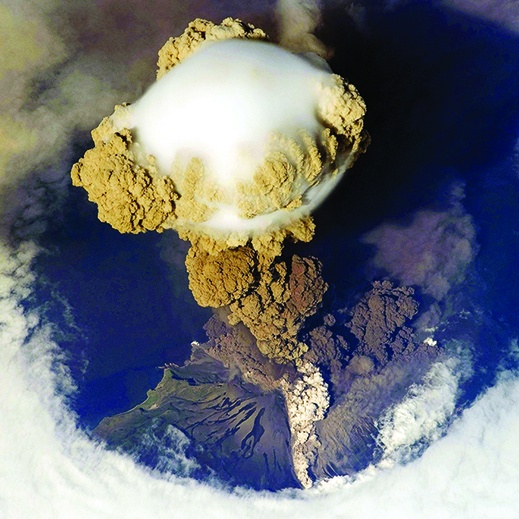New research shows that even relatively small volcanic eruptions can loft aerosol particles into the atmosphere, temporarily mitigating the global warming caused by greenhouse gases. The impact of such smaller eruptions has been underestimated in climate models, the researchers say, and helps account for a discrepancy between those models and the actual temperatures observed over the last 15 years.

The findings were reported in a paper last year in Geophysical Review Letters, coauthored by professor of atmospheric chemistry and climate science Susan Solomon, postdoc David Ridley, and 15 others. They could explain up to half the apparent slowdown in the pace of global warming recorded over the last 10 to 15 years.
“We’ve learned a lot of new things about how the earth’s climate changes, not just from year to year but from decade to decade, as a result of recent research,” says Solomon. “Several independent sets of observations show that relatively modest volcanic eruptions are important.”
For the last several years, “it’s been quite clear that the observed trends are not following what the models say,” Ridley says, adding that while the overall warming trend has continued, its rate is slower than projected. Previous research suggested that some of that discrepancy can be accounted for by an increase in the amount of warm water being carried down to the deep ocean, but other processes can also contribute.
It was already well known that large volcanic eruptions, such as that of Mount Pinatubo in the Philippines in 1991, have a global cooling effect. But the new work shows that small eruptions produce a significant quantity of aerosol particles, which reflect sunlight, in a region of the upper atmosphere that is relatively poorly monitored.
Satellites provide good data about the atmosphere down to around 15 kilometers above ground level, but then clouds interfere. Using multiple balloon, laser radar (lidar), and ground-based measurements, the team found that smaller eruptions could account for 30 to 50 percent of the recent reduction in warming.
Overall, smaller eruptions lowered the increase of global temperature since 2000 by 0.05 to 0.12 °C, counteracting some of the warming that would otherwise have occurred. Now models can be updated to more accurately project global climate change over the coming decades, Ridley says.
Keep Reading
Most Popular
Large language models can do jaw-dropping things. But nobody knows exactly why.
And that's a problem. Figuring it out is one of the biggest scientific puzzles of our time and a crucial step towards controlling more powerful future models.
How scientists traced a mysterious covid case back to six toilets
When wastewater surveillance turns into a hunt for a single infected individual, the ethics get tricky.
The problem with plug-in hybrids? Their drivers.
Plug-in hybrids are often sold as a transition to EVs, but new data from Europe shows we’re still underestimating the emissions they produce.
Stay connected
Get the latest updates from
MIT Technology Review
Discover special offers, top stories, upcoming events, and more.